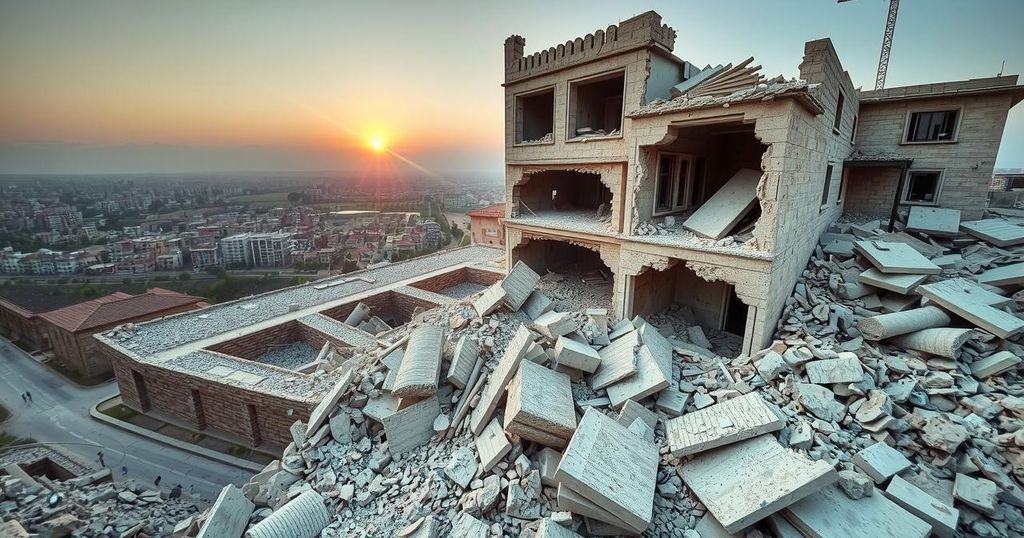The article explores the political repercussions of Assad’s regime collapse in Syria on Lebanon’s Sunni community and Hizbullah’s ongoing struggles. Islamist factions advocate for the release of prisoners, indicating a push for Sunni dominance amid Hizbullah’s waning influence. The fragmented Christian opposition, along with new Sunni dynamics, complicates the situation ahead of presidential elections, as regional instability continues to influence Lebanese politics.
The recent political climate in Lebanon, particularly following the tumultuous events surrounding the Assad regime’s collapse in Syria, has revealed significant shifts within the country’s Sunni community. Following the initial jubilation over Assad’s downfall, Islamist factions, notably Jamaah Islamiya, shifted focus to local grievances, demanding the release of Sunni prisoners from Lebanon’s notoriously overcrowded prisons. Sheikh Ahmad Shemali’s December 10 protest emphasized the urgency of amnesty for Islamists, framing it as a movement to assert Sunni authority and challenge the weakened state of Hizbullah, bolstered by recent victories of Tahrir al-Sham in Syria.
In Lebanon, the Shiite community grapples with Hizbullah’s deteriorating military presence, exacerbated by Israel’s heavy-handed offensives and the dynamic shifts in Syrian leadership. Tensions were evident during a meeting between Lebanese Armed Forces Commander General Joseph Aoun and Hizbullah’s Wafiq Safa, where Aoun advocated for the enforcement of a ceasefire agreement, showcasing Hizbullah’s struggle to maintain influence amid rising calls for reform and accountability.
Further complicating Lebanon’s political landscape, factions within the Christian community are engaged in a protracted struggle for leadership amidst accusations of collusion with Hizbullah. The Free Patriotic Movement is contested by rivals such as Samir Geagea and Camille Chamoun, indicating fractured coalitions unable to decisively endorse a presidential candidate for the upcoming elections.
As the Sunni community awakens to the implications of a Sunni regime in Syria, there are emerging concerns about potential instabilities proliferating across Lebanese borders. The memory of past conflicts with groups like ISIS looms large, making Iranian influences and radical sentiments particularly alarming. Despite the seemingly restrained approach from the Syrian leadership under Abu Mohammed al-Jolani, with overtures of non-interference, the dynamic remains precarious as Lebanese and Syrian trajectories evolve in tandem.
The political landscape in Lebanon has undergone significant changes due to regional developments, particularly following the collapse of the Assad regime in Syria. This shift has reignited Sunni activism within Lebanon, especially among Islamist groups who are pressing for reforms and the release of Sunni detainees in Lebanese prisons. The persistent challenges faced by Hizbullah amid external pressures, including confrontations with Israel and internal political fragmentation, underline the complexities of Lebanese governance and sectarian relations. This article emphasizes the implications of Syrian developments on Lebanon’s Sunni population, details the inter-community dynamics, and the potential for renewed conflicts stemming from historical grievances. The meeting between military leaders also serves to illustrate the precarious position Hizbullah finds itself in, reflecting the ongoing power struggles that characterize Lebanese politics.
In conclusion, the aftermath of Syria’s instability has catalyzed a pronounced awakening within Lebanon’s Sunni community, coupled with significant challenges to Hizbullah’s influence. The demand for amnesty for imprisoned Islamists signifies a critical step in seeking Sunni political dominance, even as regional dynamics remain brittle and volatile. Simultaneously, the Christian factions struggle to find common ground amid rising tensions, heightening the need for a stable candidate in the forthcoming presidential elections. The potential repercussions of the Syrian regime’s actions loom large over Lebanon, suggesting that the quest for equilibrium will be fraught with challenges moving forward.
Original Source: www.jewishpress.com







